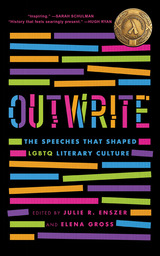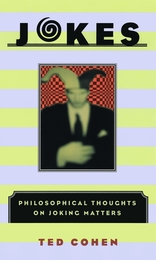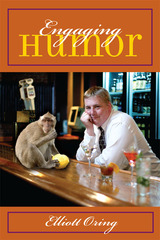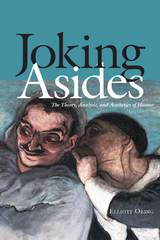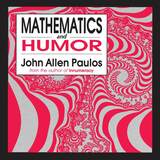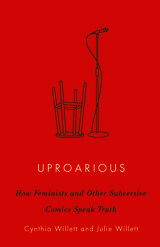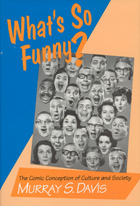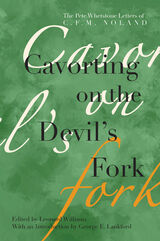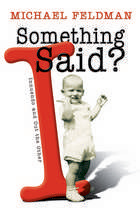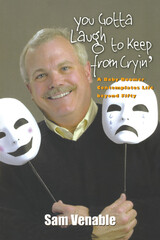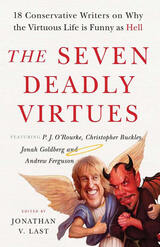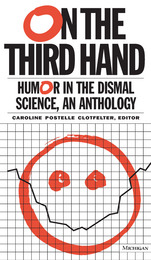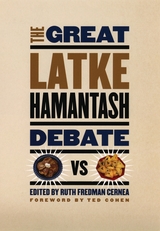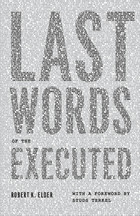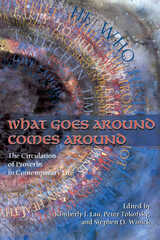What's so Funny?: The Comic Conception of Culture and Society
University of Chicago Press, 1993
Cloth: 978-0-226-13810-7
Library of Congress Classification PN6149.S62D38 1993
Dewey Decimal Classification 302.2
Cloth: 978-0-226-13810-7
Library of Congress Classification PN6149.S62D38 1993
Dewey Decimal Classification 302.2
ABOUT THIS BOOK | AUTHOR BIOGRAPHY | TOC
ABOUT THIS BOOK
Jokes, puns, stories, tales, sketches, and shticks saturate our culture. And today the stuff of comedy is almost inescapable, with all-comedy cable channels and stand-up comics acting as a kind of electronic oracle. We're laughing more often, but what are we laughing at? Murray Davis knows. In this inventive book, he uses jokes (good, bad, offensive, and classic) to reveal the truths that comedians deliver. What's So Funny? is not about the psychology of humor but about the objects of our laughter—the world that comics turn upside down and inside out. It also explores the logic of comedy as a serious, critical assault on just about everything we take for granted.
Drawing on a vast array of jokes and the work of dozens of comedians from Jay Leno and Lenny Bruce to Steve Allen and Billy Crystal, Davis reminds us of the extraordinarily subversive power of comedy. When we laugh, we accept the truth of the comic moment: that this is the way life really is. The book is in two parts. In the first, Davis explores the cultural conventions that even simple jokes take apart—the rules of logic, language, rationality, and meaning. In the second, he looks at the social systems that have been at the root of jokes for centuries: authority figures, power relations, and institutions. Whatever their style, comedians use the tools of the trade—ambiguous meanings, missed signals, incongruous characters, unlikely events—to violate our expectations about the world.
Setting comedy within a rich intellectual tradition—from Plato to Freud, Hobbes to Kant, in philosophy as well as sociology—Davis makes a convincing case for comedy as a subtle, complex, and articulated theory of culture and society. He reveals the unsuspected ways in which comedy, with its spotlight on the gap between appearance and reality, the ideal and the actual, can be a powerful mode for understanding the world we have made.
Drawing on a vast array of jokes and the work of dozens of comedians from Jay Leno and Lenny Bruce to Steve Allen and Billy Crystal, Davis reminds us of the extraordinarily subversive power of comedy. When we laugh, we accept the truth of the comic moment: that this is the way life really is. The book is in two parts. In the first, Davis explores the cultural conventions that even simple jokes take apart—the rules of logic, language, rationality, and meaning. In the second, he looks at the social systems that have been at the root of jokes for centuries: authority figures, power relations, and institutions. Whatever their style, comedians use the tools of the trade—ambiguous meanings, missed signals, incongruous characters, unlikely events—to violate our expectations about the world.
Setting comedy within a rich intellectual tradition—from Plato to Freud, Hobbes to Kant, in philosophy as well as sociology—Davis makes a convincing case for comedy as a subtle, complex, and articulated theory of culture and society. He reveals the unsuspected ways in which comedy, with its spotlight on the gap between appearance and reality, the ideal and the actual, can be a powerful mode for understanding the world we have made.
See other books on: Culture | Davis, Murray S. | Psychological aspects | Society | Wit and humor
See other titles from University of Chicago Press

